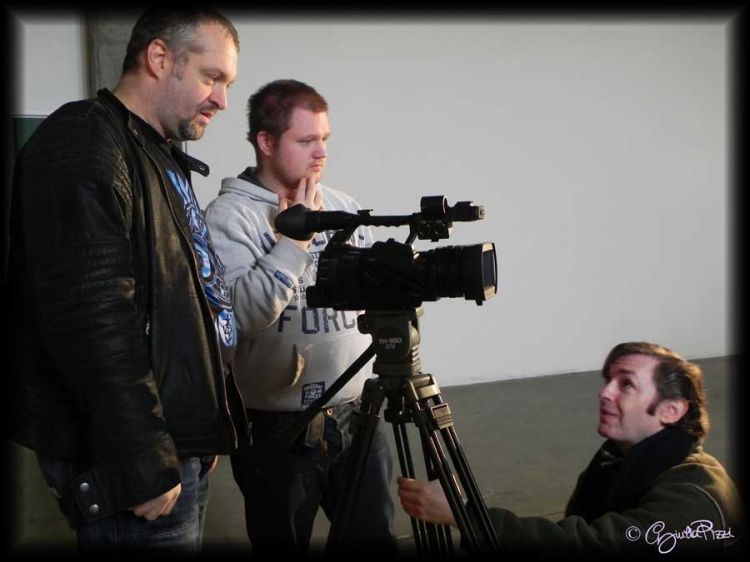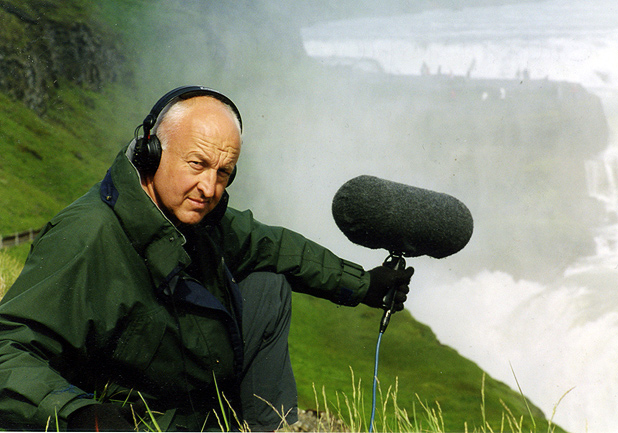Filmmaker, Producer and Sound Engineer Tony Errico’s work has included 15-years of television productions, music production and he’s the founder of production company Tiger Dreams, Musically, he has worked with bands such as The Mission, Wet Wet Wet and Aerosmith. So he knows sound, inside and out. Recently, Errico wrote an article for Raindance Film Festival’s website (where he is currently undertaking post-graduate studies) giving his top ten tips for film sound recording (you can read that here). Reading more like a list of ‘DON’T’s rather than ‘Do’s and with tongue firmly placed in cheek, here’s what Errico had to say:

Tony Errico (far left) (image: Tiger Dreams)
1. “We’ll fix it in post!”
“Yeah right! How many times I’ve heard this one. Doing ADR – Automated Dialogue Replacement – with the actors listening to the recorded dialogue and replacing it in the comfort of a recording studio with quality microphones, compression, EQ costs a LOOOOOOT of money, and time as well. And I am not even talking about the background sound here…”
2. Underestimate the sound guy recording the sound.
“If I had to listen to only one guy on a set, it would be the sound guy. I’ve been on set as Production Assistant noticing that none listened to the sound operator when he said “hum, there was a plane in this take”, and the Director thought the take was great enough not to redo it. Honestly guys! A sound guy has experience and knows what to listen to, his job is ‘hearing’ – and trust me it is a job per se. He knows what people need in post-prod, so if he says that there is a plane, then it means a big problem for later on… I would trust a sound guy a lot!”
3. One sound guy can do it all!
“Of course, and one person in a restaurant can cook, serve and wash the dishes… all at the same time! Depending on the budget it is true that a sound guy can record, mix and dub the movie, but still the skills are not quite the same, and to mix a movie, better have a pro who owns a studio or at least a perfect acoustic place to do so. You don’t want muffled dialogue.”
4. Using the microphone of the camera will do!
“Then why not shoot your movie with a phone cam? Any mirophone will do! Yeah right, then why some microphones are worth thousands of pounds and some £10? Never wondered why in a professional music studio there are hundreds of different microphones? To record high-quality location sound the right type of microphone must be used: ultra-directional for external locations, directional (shorter) for interiors, and non-directional for cramped interiors. The more directional the microphone, the greater the extent to which it selectively picks up sounds from its front end, and the higher the signal-to-noise ratio will be. And professional microphones uses XLR connections! So if you have a jack microphone, it won’t sound as good as it should, this is a sign!”

Sound Recordist Shalini Agarwal on-set of ‘Slumdog Millionaire’
5. Underestimate the location!
“When you check the location, you should bring the sound guy with you if you want to be pro! He will then know exactly what needs to be done to get the best sound recording there. A room without windows, posters or furnitures will reverb a lot, hence will be very difficult to deal with, to edit and mix. An important rule to master is: once there is a reverb or echo on a recording YOU CANNOT TAKE IT OFF! But it is easy to ADD one on a perfect recording neutral of effects.”
6. Record the sound with the music or background noise is fine!
“Of course, then when you choose your correct take and mix it, that’ll be fun! Same as 5) here, once a background sound is on the dialogue, it is impossible to take it off, but if the dialogue is clean, you can easily add a background music, noise etc The cleaner your dialogue, the better for post-production.”
7. We don’t need a “wild/walla/atmo track”!
“Then I am wondering how your dialogue will sound like… If you edit a dialogue leaving spaces between them or taking a dialogue from one take and the other from another take, there is a big chance that the background noise is slightly different, then, people will hear it, and it will distract the audience. Is that what you want? Really? Avoid this by always record a “wild track” – or ambient sound = one minute of total silence on a set, before or after the main shooting – to have a neutral background sound. So useful that you cannot live without.”
8. Anyone can be a boom operator, I’ll ask a friend
“Cool, then I should ask my mum too! A Boom operator knows what to do and most of all what NOT TO DO! When you move your hands on the boom, you touch the XLR cable then the sound is recorded on top of the dialogue! Microphones are very very sensitive, any movement or noise will be recorded. And this is why a boom operator should always wear headphones, to hear ONLY the recorded audio and not the sound on the set!”
9. Overlapping dialogue is fine!
“Then how would you mix them if you need to change one? Or take a dialogue from another take? If you can, it is very good to avoid overlapping dialogues, you can ask your actors to “play it” as to avoid it, not easy but far easy on post-production!”
10. Use of a song is fine, no one will notice, or we’ll get the right afterwards!
“Mmmmh…. Copyright issues regarding music is a very common problem. If you need a specific song for your movie, be sure that you have the right BEFORE you shoot the scene, or prepare a backup song. Especially if your actor has to sing on it, cos if you don’t get the right, it means you might have to reshoot the scene or let it go! On how to get the right of a song, there are many Raindance courses about it, as it is a big subject per se, and complicated too. Honestly if I had to pay ONE guy only on my set, it would be the sound operator! The Director of Photography and sound guy are the most important people on a set for me! If I can take them with me on a location recce, I definitely would, cos they would know what works and does not. One last advice on sound recording on set: it all depends on the technique used – there are many – but mainly PROXIMITY IS KING! So get the microphone placed properly and it should do the trick.” Want More? Here’s another 5 tips for recording sound on location.

Sound Recordist Chris Frith
ABOUT RAINDANCE Raindance Film Festival was started in 1992 and is well regarded as being at the heart of Indie filmmaking. The festival has uncovered some of the world’s best loved filmmakers, for example some Raindance-premiered hits are Pulp Fiction, Memento, the Blair Witch Project, Ghost World and Love Exposure. In 1998 Raindance launched the British Independent Film Awards, an annual industry event. In addition to the festival, the organisation also trains you filmmakers each year through a variety of courses. Some of the high profile alumni include Christopher Nolan (Batman Begins), David Yates (Harry Potter), Guy Ritchie (Lock, Stock and Two Smoking Barrels) and Matthew Vaughn (Kick-Ass). For More on Raindance, be sure and check their website: www.raindance.org Feature image: Sound Recordists Chris Watson (image: lists/uk)





Mike Muikia
Great one. I am learning alot from this wonderful site. Only I am a little underprivileged. Very expensive gears and cameras and rarely found here. I am working on telling African stories of war, conflicts and resilience that comes with it. Last three years I save money and purchased a second hand Mac but I have no camera. Three more years I will save for a camera. Anyone willing to help a brother in rural Kenya will be blessed. Here is my work; https://www.youtube.com/watch?v=reu3X3NS7sk&list=UUC5hk3YBs5RkTXTqCumhMEw, https://www.youtube.com/watch?v=sCtHDwp1X6M&list=UUC5hk3YBs5RkTXTqCumhMEw, https://www.youtube.com/watch?v=Q_D2APN6ItY&list=UUC5hk3YBs5RkTXTqCumhMEw, https://www.youtube.com/watch?v=6NhLmAMBwDo&list=UUC5hk3YBs5RkTXTqCumhMEw
I need your help. Thank you.
Warmly,
Mike Muikia
Juja, central Kenya
Mobile/Whatsapp: +254 724 708 491
email: mike.iofc.ke@live.com
Nicole Boyd
Best of luck! It might be an idea to try to use Kickstarter? If you have a project you can raise the funds you need to purchase your gear there. Indiegogo & Pozible are two other great sites for crowdfunding.
V&F Online Ed.
Finn Stewart
I like how you mentioned you should bring the sound guy with you when scouting a location. It makes sense that the sounds guy would know how a room and the surroundings could affect the sound. I have a friend who works for a company that wants to make a commercial. I’ll have to let him know about the benefits a sound guy can bring to a commercial